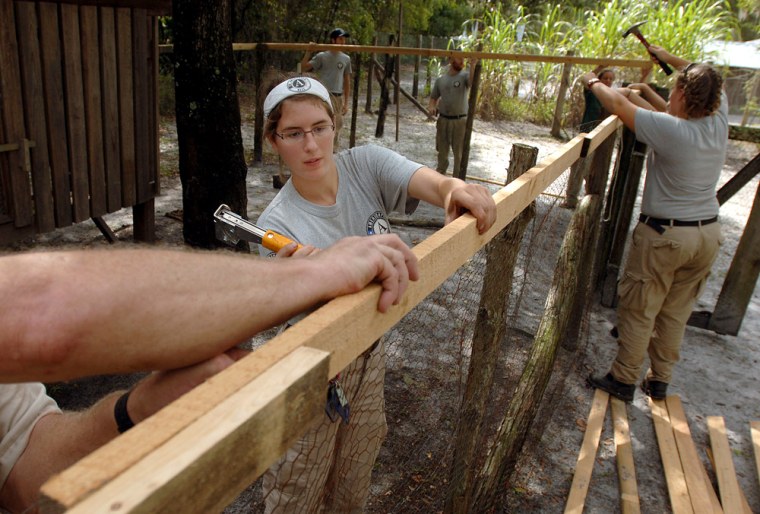Want a job making the world a better place, earning a salary at the kind of work people usually do for nothing? Even in a down economy, there's some great news. Stimulus money is creating 13,000 new AmeriCorps jobs this year, and the federal government is in heavy hiring mode across a range of careers. In addition, billionaire donors like Bill Gates are continuing to fund philanthropic work around the globe.
Meanwhile, the Zeitgeist favors all manner of do-gooding. Young people have grown more interested in considering public service jobs, and employers have increasingly come to view a stint with the Peace Corps or Habitat for Humanity as a plus on a job-seeker's résumé, says Joseph Du Pont, who runs the career center at Brandeis University in Waltham, Mass.
"If you can develop leadership skills and provide concrete evidence of your accomplishments at a job somewhere like Teach for America, the Peace Corps or any private or nonprofit organization that does good, an employer is going to want you," Du Pont says.
But there's also bad news for public-spirited job seekers: Competition is way up across a range of jobs, from relatively high-paying posts like program officer at the Bill & Melinda Gates Foundation (mid-level program officers make $150,000) to low-paid positions at the Peace Corps and AmeriCorps. The Peace Corps requires a 27-month commitment. You get a modest living allowance and health insurance and are given $6,000 at the end of your stint. Yet applications have risen 12% in 2009. At AmeriCorps, the number of applicants has tripled over last year.
So what's a public-spirited college graduate to do? In an article for Slate.com in April, Patty Stonesifer, former chief executive of the Gates Foundation, made an excellent suggestion: Follow the money. Track news in the nonprofit sector, and check out the organizations with the fattest budgets; most post jobs right on their Web sites.
The Gates Foundation, for instance, currently lists 32 positions in Seattle, Washington, D.C., and London. Though Gates isn't expanding as fast as last year, when it snapped up 280 people, it's still hiring. Alltop has one of many useful Web pages that track news about nonprofits.
Another great resource: Idealist.org, the world's largest nonprofit job Web site. It not only has a job board, which currently offers 5,000 postings, but also is packed with helpful information and news you can use, including three free online books about how to pursue a nonprofit career.
At the risk of stating the obvious, would-be do-gooders should not hesitate to volunteer. A recent survey showed that 54% of nonprofit employers consider volunteer work the most valuable experience a candidate can have.
Then there is the wide world of work outside the realm of traditional nonprofits. At the top of that list should be government employment, says Max Stier of the Washington-based Partnership for Public Service, a group that promotes government jobs. Much of the most meaningful, world-changing work happens inside the federal government, Stier insists.
"Government jobs include everything from national park ranger to the best scientists in the world," he says. He adds that job seekers may not realize that 85% of federal government postings are for employment outside the nation's capital.
Government employment is surging right now for several reasons, Stier explains, including pent-up demand at agencies like the Social Security Administration and the Veterans Administration. Uncle Sam will hire 600,000 people over the next four years, a 50% increase over the previous four, Stier says.
Beyond government, there are a multiplicity of other job opportunities that may not immediately come to mind for philanthropy-minded college graduates. Will Marre, author of Save the World and Still Be Home for Dinner, exhorts young people to study marketing and development and to consider jobs outside the traditional nonprofit sector.
"Most people want to hold babies and work with mothers and orphans," Marre notes, "but the real jobs are the ones that generate income." He says that people with M.B.A. degrees and marketing majors are the most qualified to delve into fields like "cause marketing," where a nonprofit teams up with a for-profit enterprise to generate cash. An example: cycling champ Lance Armstrong's collaboration with Nike, which donates 100% of the profits from its Livestrong line of athletic wear to Armstrong's foundation.
Marre also thinks civic-minded job seekers should consider careers in the budding field of social entrepreneurship, where for-profit businesses make it their mission to do good. For instance, the South African outfit Roundabout Outdoor supplies rural areas with water pumps driven by a human-powered merry-go-round mechanism, and makes money selling advertisements on its water towers.
The field of micro-credit is also gaining traction. Lending outfits like the Grameen Foundation are expanding and hiring in the U.S., and traditional banks like Citigroup are starting micro-credit operations. A business degree is obviously useful when it comes to applying for these jobs.
Finally, consider doing good from the inside with traditional employers. Though Wal-Mart's do-gooder track record is debatable, Carolyn Cavicchio, senior research associate for global corporate citizenship at the Conference Board, notes that the behemoth big-box retailer has undertaken many green initiatives over the last few years, such as instituting energy-saving packaging requirements for suppliers and selling compact fluorescent light bulbs. So you can get paid to do good even there.
